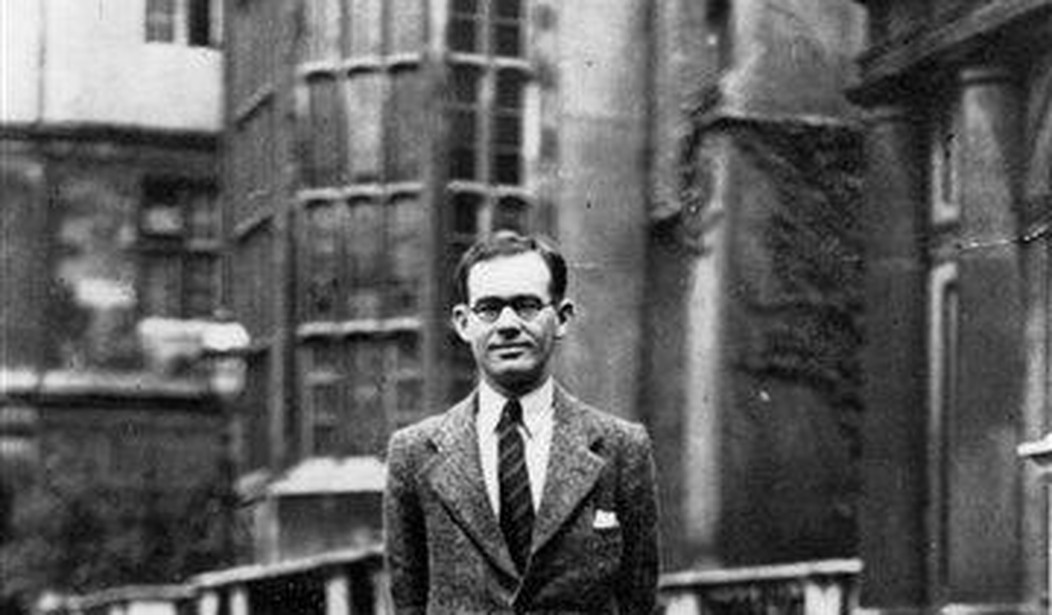Having linked at Instapundit to a couple of reviews of the new film about the journalist who first went on the record about the Soviet Union’s terror famine in Ukraine in 1933, titled Mr. Jones, I bit the bullet and purchased it from Amazon Prime Video. I wanted to like this film so, so much, given that it focuses on a subject that Hollywood moviemakers have avoided for decades. And while Mr. Jones has many excellent moments, it also has several scenes that ultimately work against it as a film.
But it’s a very noble failure. The man in the title is real-life Welsh journalist Gareth Jones (1905-1935), played by James Norton. But he’s really not what makes Mr. Jones so important a film. That person is the now infamous Walter Duranty, the New York Times’ man in Moscow, Stalin’s stenographer, played by Peter Sarsgaard. Previously, Sarsgaard co-starred in another film about a leftwing fabulist run amok, Shattered Glass, playing the editor of the New Republic’s Stephen Glass.
In 1932, Duranty won a Pulitzer for his lies that, as Lincoln Steffens wrote in 1919, the Soviet Union and its capital-C-Communism was “the future, and it worked.”
It didn’t. And the Times, which apparently now sees the Soviet Union as some sort of extended experiment in free love under Premier Austin Powers, has yet to return the Pulitzer.
“You’re Rather Dull, Mr. Jones.”
At the beginning of the film, the polymath Jones, who speaks English, French, German, and Russian, is employed as a foreign affairs adviser to Prime Minister Lloyd George. He’s mocked by Lloyd George’s cabinet after his interview with Hitler convinces him that there’s a very likely coming war with Germany and/or the Soviet Union. Lloyd George’s cronies believe that Hitler has too many internal problems dealing with Germany to ever strike outward.
Afterward, alone at night in his darkened office, he crunches the numbers on the Soviet Union’s financials, and compares it to Stalin’s endless boasts that his nation was producing new factories, dams, and airplanes, and keeping its workers housed, fed, clothed, and happy. He discovers the numbers don’t add up. Unfortunately, given that it’s the Depression, neither do England’s, and Jones is let go from employment by Lloyd George’s office.
As a token of goodwill, Lloyd George writes Jones a glowing recommendation to whoever his next employer will be, but this document will instead be used by Jones as his entry into the Soviet Union, similar to how the “letters of transit” serve as Casablanca’s “MacGuffin.”
Once in Moscow, Jones is introduced to Duranty. A group of American and British foreign correspondents, impressed with that Jones managed to snag an interview of Hitler, invite him along to one of Duranty’s Gatsby-esque parties, which features straight sex, gay sex, women shooting heroin, and a jazz band playing Cab Calloway’s 1931 hit “Minnie the Moocher,” a song loaded with drug references. By the end of the evening, having rebuffed offers of booze, drugs, and sex from both sexes, Jones runs into a naked Duranty, who says to him, “You don’t drink. You don’t appreciate the gorgeous girls at my party. You are rather dull, eh, Mr. Jones?” To which Jones replies, “There are other things in life, I suppose. I’m standing opposite a completely naked Pulitzer Prize winner. My life can’t be that dull, can it?”
Mr. Jones: Movie Depicts When The New York Times Helped Stalin Cancel 10 Million
Jones becomes friendly with Ada Brooks (played by Vanessa Kirby), one of Duranty’s colleagues, whose journalist boyfriend was shot by the Soviets when he wanted to venture into Ukraine. In a scene that plays well to modern audiences familiar with the now bipartisan phrase, “fake news,” Jones tells her, “I don’t have an agenda. Unless you call truth an agenda.” “Yes, but whose truth?” Brooks replies. “The truth. There is only one kind.” Jones says. “That’s so naïve,” Brooks scoffs. Jones tells her that “Journalism is the noblest profession. You follow the facts, wherever it leads. You don’t take sides.”
But would a British journalist in 1933 actually say that? Prior to the development of mass media in the 1920s, journalism catered to a diverse audience on both sides of the aisle, from socialists to conservatives. And even in the era of America’s midcentury conformist journalism, Fleet Street’s output stayed remarkably diverse, as this classic clip from the BBC’s Yes, Prime Minister highlights:
Might the Soviets Win the Cold War After All?
“They Are Killing Us. Millions Gone.”
Because Jones’ mother was a teacher in Ukraine, he decides to see for himself the terror famine going on there. He eludes his Soviet handler on a posh first-class passenger train, and, at a stop, hops onto a train of boxcars loaded with workers on its way to a granary. In a scene based on Jones’ own writings, “I flung a crust of bread which I had been eating from my own supply into a spittoon. A peasant fellow-passenger fished it out and ravenously ate it. I threw an orange peel into the spittoon and the peasant again grabbed it and devoured it.”
Once the train arrives, Jones observes firsthand the horrors of a people being starved to death; the output of the granary is shipped by rail to Moscow. Unfortunately, as a cinematic experience, the unremitting bleakness of the film’s second act works against it. There’s little dialogue, the colors are desaturated, leaving pale white flesh and blinding white snow, and no music, which while a valid artistic choice, makes these scenes grind interminably on.
While the scene in the boxcar is highly reminiscent of David Lean’s Dr. Zhivago, Lean at least had Maurice Jarre providing the score. At the apex of the second act, observing a brutal fight over a loaf of bread (in front of a gigantic banner depicting Stalin holding a golden bushel of wheat), Jones meets a woman and asks her, “How long has this been going on? Black earth — that’s what my mother called it. The black earth region could feed the world. Please tell me what happened here.” “What do you think happened?” she says. “They are killing us. Millions gone.” “Millions, but why?” Jones asks.
“Men came and thought they could replace the natural laws.”
The terror in the second act isn’t overtly grisly. These scenes are all based on misdirection and not knowing what horrors await next, but the second act of the film grinds on for so long, I had to pause the video just to go outside and remind myself that, even in the midst of an America whose cities were being looted and whose monuments are being destroyed, we’re not at this stage yet.
“It’s a Shame. You Would Have Made a Fine Journalist.”
Eventually, Jones is caught in Ukraine, arrested as a spy, and sent back to England — provided he does not report what he has seen there. On his way out of the Soviet Union, Jones meets Duranty again, who tells him:
“I’ll have you know I convinced them to let you go. You don’t deserve to be in a prison for your bravery.”
“You knew, Mr. Duranty,” Jones replies. “How much is Stalin paying you? What’s keeping you here, lying for them?
Duranty replies, “You wouldn’t know the first thing about how difficult it is to report from Moscow today. Would you? Of course not. You’re just a child. But it is not the job of a journalist to say, ‘How dare you, sir.’ You actually thought you could interview Stalin, and make some kind of difference, didn’t you?”
Jones hands Duranty “a souvenir from my trip. Tree bark. It’s all the people have left to eat. You keep it next to your Pulitzer.”
“Mr dear Mr. Jones,” Duranty replies. “There comes a time in every man’s life when he must choose a cause greater than himself. Than all his miserable little ambitions put together. Perhaps someday, you will. It’s a shame. You would have made a fine journalist.”
Jones would eventually pay the ultimate price, but not before getting his story out to the world. But it would take decades for the brutal reality of the Soviet Union to be understood. As Kingsley Amis famously said to Robert Conquest, the author of The Great Terror, its second edition should have been retitled, “I Told You So, You F***ing Fools.”
The Manchurian Media
“All Animals Are Equal, But Some Animals Are More Equal Than Others.”
In his review at Hollywood in Toto, Christian Toto noted that at several points in the film, George Orwell is awkwardly shoved into the film. “Yes, the celebrated scribe fed off Jones’ reportage for ‘Animal Farm,’ but his appearances here serve only to distract,” Toto correctly writes. Pity that Malcolm Muggeridge, who actually got the story of Stalin’s terror famine first, but whose articles were published anonymously by the Manchester Guardian, doesn’t make a cameo as well. (Muggeridge said that Duranty was “the greatest liar of any journalist I have met in 50 years of journalism.”
Naturally, at Roger Ebert.com, film reviewer Tomris Laffly draws the precise wrong conclusion from Mr. Jones:
And there are also passages here and there that will sound depressingly familiar to any viewer in the Trump era. “Does he really believe everything he says,” Jones is asked about Hitler for instance, by someone who’s just read his interview with the Fuhrer. “He’s deranged,” someone suggests, but perhaps with a side of misjudged flippancy.
The review is dated June 19th, two weeks after Trump let individual mayors handle their cities’ riots without sending in the US military and delivering an armed national response, avoiding the optics of a Nixonian Kent State moment. Worst. Totalitarian. Dictator. Ever.
Instead, with its references to both Hitler and Stalin, National and International Socialism, and boxcars filled with starving people, Mr. Jones is an extremely timely look at the aftermath of leftist radicals deciding to toss a nation’s history and culture aside and “start from zero.” Along with the appearances of Walter Duranty, who reminds modern viewers, familiar with the Gray Lady’s ongoing “1619 Project,” that fake news is nothing new from the New York Times.
Mr. Jones is recommended, but with reservations. This is a story that deserves to be told in cinematic form, but could have benefitted enormously from a background score and judicious editing.










Join the conversation as a VIP Member